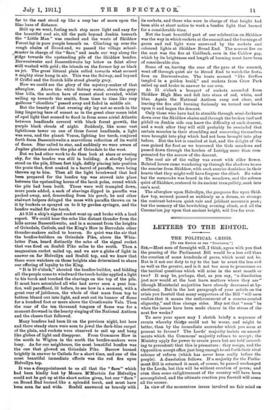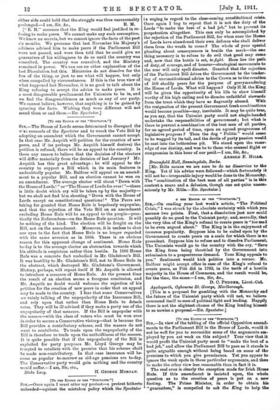LETTERS TO THE EDITOR.
THE POLITICAL CRISIS.
[TO THE EDITOR OP THE "SPECTATOR."] SIR,—Most men of foresight will, I think, agree with you that the passing of the Parliament Bill would be a less evil than the creation of some hundreds of peers, which must not be. But is it not our duty to try to the last to avert the less evil as well as the greater, and is it not too soon to pronounce on the tactical questions which will arise in the next month or two? It may be, perhaps, that, as you say, "a dissolution just now would at the best leave matters where they are" (though Ministerial majorities have already decreased at by- elections). But in the last paragraph of your article on the crisis you foretell that many supporters of the Bill •` will soon realize that it means the enthronement of a caucus-created oligarchy," and thus change sides. May not that " soon " be when the issues have been made clearer in the stress of the next few weeks ?
To save your space may I sketch briefly a sequence of events whereby things could not be worse, and might be better, than by the immediate surrender which you seem at present to favour? The Lords' majority insists on amend- ments which the Commons' majority refuses to accept; the Ministry apply for power to create peers but are told (accord- ing to precedent) that this is premature : they resign, and the Opposition accept office just long enough to set forth their rival scheme of reform (which has never been really before the people). A dissolution follows. If a majority for the Parlia- ment Bill is returned it must, of course, be passed unchanged by the Lords, but this will be without creation of veers; and even then some enlightenment of the country will have been accomplished, and the ultimate reaction you foretell will come
all the sooner. •
In view of the momentous issues involved no fair mind on
either side could hold that the struggle was thus unreasonably
[" E. M." assumes that the King would feel justified in re- fusing to make peers. We cannot make any such assumption. We know no secrets, but we cannot ignore the facts of the past six months. We presume that last November his Majesty's advisers advised him to make peers if the Parliament Bill were not passed, and were then told that he could give no guarantees of his willingness to do so until the country was consulted. The country was consulted, and the Ministry remained in power. We can see no other explanation of the last Dissolution but this. Ministries do not dissolve for the fun of the thing, or just to see what will happen, but only when compelled by circumstances. If this is the true view of what happened last November, it is no good to talk about the King refusing to accept the advice to make peers. It is a most disagreeable predicament for Unionists to be in, and we feel the disagreeableness as much as any of our party. We cannot believe, however, that anything is to be gained by Ignoring the facts. Wishing they were different will not mend them or end them.—ED. Spectator.]















































 Previous page
Previous page